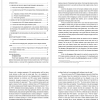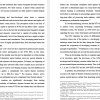Тема: WTO dispute settlement system: reform and development
Закажите новую по вашим требованиям
Представленный материал является образцом учебного исследования, примером структуры и содержания учебного исследования по заявленной теме. Размещён исключительно в информационных и ознакомительных целях.
Workspay.ru оказывает информационные услуги по сбору, обработке и структурированию материалов в соответствии с требованиями заказчика.
Размещение материала не означает публикацию произведения впервые и не предполагает передачу исключительных авторских прав третьим лицам.
Материал не предназначен для дословной сдачи в образовательные организации и требует самостоятельной переработки с соблюдением законодательства Российской Федерации об авторском праве и принципов академической добросовестности.
Авторские права на исходные материалы принадлежат их законным правообладателям. В случае возникновения вопросов, связанных с размещённым материалом, просим направить обращение через форму обратной связи.
📋 Содержание
1. OVERVIEW OF THE WTO DISPUTE SETTLEMENT MECHANISM 5
1.1. What is the WTO dispute settlement mechanism? 5
1.2. Correlation between the WTO and regional bodies of international adjudication. 12
1.2.1. Regulation of relations between WTO and regional organizations 12
1.2.2. Prospects of jurisdictional conflicts 14
1.2.3. Free Trade Agreements 20
2. REFORM OF THE WTO DISPUTE SETTLEMENT MECHANISM 25
2.1. Prerequisites for the WTO dispute settlement mechanism crisis 25
2.2. Current state of the WTO dispute resolution system 28
2.3. Main approaches for the Appellate Body’s crisis resolution: Draft Decision on
the Functioning of the Appellate Body and Multi-Party Interim Appeal Arbitration Arrangement 34
3. THE PROSPECTS OF DEVELOPING STATES PARTICIPATION IN THE WTO
DISPUTE SETTLEMENT SYSTEM 43
3.1. Overview of developing states’ participation in WTO dispute resolution system. 43
3.2. Main issues of developing states’ participation in WTO dispute resolution
system 47
3.3. Advisory Centre on WTO Law: legal assistance to developing states within the
WTO dispute settlement system 51
CONCLUSION 59
LIST OF CITATIONS 62
📖 Введение
Aside from the general overview of the dispute settlement system, the master thesis focuses on organizational, functional, and legal obstacles which WTO Member States have been facing during the resolution of trade conflicts, i.e. the thesis addresses (1) issues of correlation between WTO system and regional integration associations as well as prospects of their overlapping; (2) current crisis caused by the US blockage of re-appointment of WTO Appellate Body members; and (3) constraints affecting participation of developing states in the system.
Overall, the master thesis evaluates WTO’s crisis which the dispute resolution system (DRS) is currently facing, its angles and evolution as well as possible ways to overcome it. The crisis is primarily connected to systematic issues existing within the adjudication mechanism and the blockage of the Appellate body - the so-called “second instance” of the system, by the US. Due to these obstacles, Appellate Body faced certain constraints precluding it from adjudicating on new appeals from first- instance panel reports, and thus, it has been paralyzed, and the number of disputes brought to the WTO has drastically decreased.1
Considering the current political climate, the operation of the most significant quasi-judicial platform for international trade relations between states must not be disrupted. The fact that the WTO dispute settlement system cannot function at full capacity leaves trade disputes between states unresolved and therefore creates a dangerous gap in international trade introducing more damage to the global economy. The relevance of the master thesis lies in the reformation of the dispute settlement mechanism which would bring the system “back to life” and subsequent development prospects.
In this vein, the purpose of the research is to analyze the current state of the WTO dispute resolution system and to assess the prospects of its transformation and improvement. To conduct the analysis, the following objectives are set to be fulfilled:
• to examine the structure and functional division within the dispute resolution system;
• to assess the statistical analysis of the WTO dispute resolution mechanism operation;
• to evaluate the development of the WTO dispute resolution system;
• to assess recommendations rendered by academic scholars regarding the reformation of the system;
• to research and evaluate the development prospects of the WTO dispute resolution system;
• to evaluate the main issues which WTO Member states face during participation in the resolution of trade disputes.
The methodological framework of the research encompasses academic and practical papers of the following scholars and practitioners: Johannesson L., Cottier T., Al Shraideh S., Hoekman B. M., Mavroidis P. C., Furculita C., Davey W., Isachenko T., Saveliev O., Zhang W., Sabelnikov L.V., Rachkov I.V., Trunk-Fedorova M.P., Smbatyan A.S., Boklan D., etc.
✅ Заключение
In the context of WTO’ dispute resolution a regional integration aspect should be taken into account. Even though regional forums and WTO’ DRS de jure exist as separate entities, still their functioning is quite intertwined. The most problematic issue in that regard is the conflict of jurisdictions since legal framework of regional integration is tied closely to WTO regulations. The AB crisis greatly contributed to the issue. Prior to the existing constraints states usually chose the WTO system due to its well-known advantages, e.g. sufficient time restrictions, predictability, high percentage of implemented decisions and etc. State’s ability to file an appeal was a critical factor for disputing parties. Currently, since such an option is blocked, regional forums in some cases (whenever the issue’s review requires deep evaluation in the regional context) may become a much more preferable choice. Thus, in order to avoid possible ambiguity in the future it is proposed that a forum exclusion clause should be added to international treaties stating that once a dispute has been submitted to the WTO or a regional justice body, the same issue cannot be reexamined by a different judicial body.
In any case the issue of Appellate Body’s crisis seems to be the main stumbling rock preventing WTO dispute settlement system from efficient operation and development. The US have been limiting AB’s functions for quite some time. In 20162019 their actions have finally led to AB’s practical blockage. Overall, the US objections concerned the time frame for dispute adjudication by the AB, wrong interpretation of WTO provisions, giving previous AB’s reports a binding precedential status and reviewing factual findings of the panels outside of the Article 17.6 of the DSU scope. The issues raised by the United States were controversial which resulted in numerous debates among WTO member states. General reaction, however, appeared to be negative. WTO members have been actively trying to settle the existing problems for the US suggesting different approaches to resolve these issues. These attempts remained fruitless. To date the prospects of AB’s renewal are unclear.
WTO member states have employed a temporary solution to fill the existing vacuum in appeal proceedings. Article 25 of the DSU has provided for an institutional substitute needed to address the AB’s crisis. Pursuant to this DSU provision, a great number of WTO member-states have entered into the Multi-Party Interim Appeal Arbitration Arrangement under which states agreed to appeal WTO panel reports resorting to appellate arbitration pursuant to Article 25 of the DSU established within the MPIA forum. Notwithstanding, that to this date, only a few disputes have been appealed under the MPIA, it presents a promising alternative to Appellate Body’s proceedings within the WTO system and essentially resolves the issue of AB’s paralysis for now.
In the context of WTO dispute settlement system, the issue of developing states’ participation is quite significant. Even though the number of developing countries in WTO is relatively higher than of developed states, rates of actual participation show a completely different picture. That is due to the fact that developing states face serious limitations when it comes to dispute resolution within the WTO, e.g. they cannot afford high legal and administrative costs of the dispute settlement procedure; in some instances these states are not willing to harm or in any way upset their international relations with more powerful countries; in case the respondent of the developing state does not comply with panel’s report, it may be quite difficult for a small economy to impose retaliation measures; governmental representatives and legal counsels of developing states are not sufficiently informed about perspectives of dispute resolution under WTO’s proceedings. In order to address these limitations, the Advisory Centre on WTO Law was created. It is an organization which is mostly funded by developed states to assist developing nations in WTO dispute resolution and provide legal assistance and WTO law training. ACWL is a unique centralized institution operating within discretion and relying on certain principles. It has positively influenced developing states’ level of participation in dispute settlement by strengthening their position and bringing balance into the whole dispute resolution system.
...





